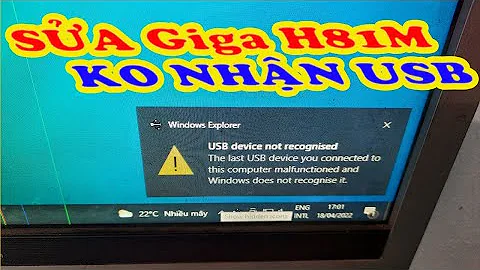Execute a command when a device is connected via USB
Solution 1
You could parse /var/log/messages, but I wouldn't.
I'd write a udev rule that ran a script when you connect/disconnect the device. There's some more information on it here
I've copied the salient points in case that site goes down:
Rule files are stored in the
/etc/udev/rules.d/directory.There's some advice from the README in that directory on how to name rule files:
Files should be named xx-descriptive-name.rules, the xx should be chosen first according to the following sequence points:
< 60 most user rules; if you want to prevent an assignment being overriden by default rules, use the := operator.
these cannot access persistent information such as that from vol_id
< 70 rules that run helpers such as vol_id to populate the udev db
< 90 rules that run other programs (often using information in the udev db)
=90 rules that should run last
The first part of a udev rule is the matching keys. We will use the KERNEL entry from the very top of the chain as well as the idVendor, idProduct, and serial attributes from the device specific information. This will positively identify this particular thumb drive and ignore all others. The kernel argument uses a question mark as a wild card so that if our drive were mounted on a different node (ie: sda1, sdb1, sdc1, etc.) it could still be identified.
KERNEL=="sd?1", ATTRS{idVendor}=="13fe", ATTRS{idProduct}=="1f00",
ATTRS{serial}=="50E6920B000AE8"
Now that we have the keys necessary to identify the particular hardware we’re looking for we can add assignment arguments. In our case we added two. The first creates a symlink to this device inside of the /dev/ directory. The second executes a script in our home directory:
SYMLINK+="hackaday", RUN+="/home/mike/notify-plugin.sh 'HackaDay Thumbdrive:' 'Connected as: $KERNEL'"
Here is the final rule assembled into one line:
KERNEL=="sd?1", ATTRS{idVendor}=="13fe", ATTRS{idProduct}=="1f00", ATTRS{serial}=="50E6920B000AE8", SYMLINK+="hackaday", RUN+="/home/mike/notify-plugin.sh 'HackaDay Thumbdrive:' 'Connected as: $KERNEL'"
We added this as the only line in our rule file and then restarted udev using these commands:
sudo nano /etc/udev/rules.d/81-thumbdrive.rules
sudo /etc/init.d/udev restart
Solution 2
Yes, every time you plug in or disconnect and USB device, a message (or messages) is (are) written in the /var/log/messages. You can easily check those out using the command dmesg. It wouldn´t be entirely unreasonable to poll that file every (x) units of time to check for connect/disconnect messages and act accordingly.
Related videos on Youtube
Yusma Imtiaz
Updated on September 18, 2022Comments
-
Yusma Imtiaz almost 2 years
I currently have a system that backs up my Linux server onto a USB storage device on
/media/usb. This all works correctly. However, I actually have 2 drives which we try to swap on a daily basis.Is there anyway of logging when a USB device was plugged in and a way of using
sendmailor something similar to send an email to the administrator if the drive hasn't been swapped for 3+ days for example?-
 Admin about 12 yearsI'm not sure if this question is off topic or not, but maybe you could try asking at SuperUser?
Admin about 12 yearsI'm not sure if this question is off topic or not, but maybe you could try asking at SuperUser?
-
-
Yusma Imtiaz about 12 yearsThanks! I ran with this and it works brilliantly. I just used UDEV to store a time the drive was swapped and in my backup script, it checks that file and pings off and email if it doesn't match my criteria!
-
CMCDragonkai almost 10 yearsWould it make sense to somehow get udev events and log them into journald?




